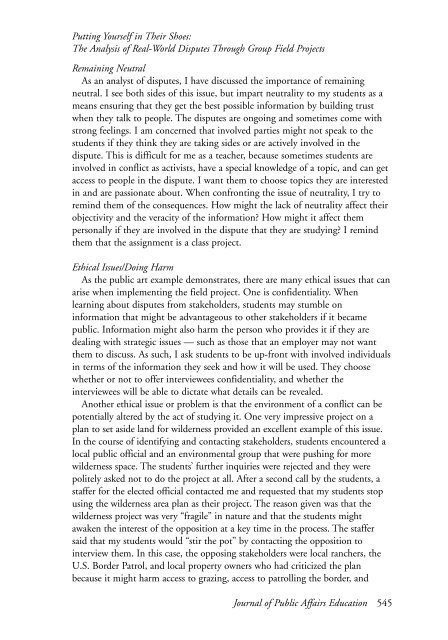JOURNAL OF PUBLIC AFFAIRS EDUCATION - National ...
JOURNAL OF PUBLIC AFFAIRS EDUCATION - National ...
JOURNAL OF PUBLIC AFFAIRS EDUCATION - National ...
Create successful ePaper yourself
Turn your PDF publications into a flip-book with our unique Google optimized e-Paper software.
Putting Yourself in Their Shoes:<br />
The Analysis of Real-World Disputes Through Group Field Projects<br />
Remaining Neutral<br />
As an analyst of disputes, I have discussed the importance of remaining<br />
neutral. I see both sides of this issue, but impart neutrality to my students as a<br />
means ensuring that they get the best possible information by building trust<br />
when they talk to people. The disputes are ongoing and sometimes come with<br />
strong feelings. I am concerned that involved parties might not speak to the<br />
students if they think they are taking sides or are actively involved in the<br />
dispute. This is difficult for me as a teacher, because sometimes students are<br />
involved in conflict as activists, have a special knowledge of a topic, and can get<br />
access to people in the dispute. I want them to choose topics they are interested<br />
in and are passionate about. When confronting the issue of neutrality, I try to<br />
remind them of the consequences. How might the lack of neutrality affect their<br />
objectivity and the veracity of the information? How might it affect them<br />
personally if they are involved in the dispute that they are studying? I remind<br />
them that the assignment is a class project.<br />
Ethical Issues/Doing Harm<br />
As the public art example demonstrates, there are many ethical issues that can<br />
arise when implementing the field project. One is confidentiality. When<br />
learning about disputes from stakeholders, students may stumble on<br />
information that might be advantageous to other stakeholders if it became<br />
public. Information might also harm the person who provides it if they are<br />
dealing with strategic issues — such as those that an employer may not want<br />
them to discuss. As such, I ask students to be up-front with involved individuals<br />
in terms of the information they seek and how it will be used. They choose<br />
whether or not to offer interviewees confidentiality, and whether the<br />
interviewees will be able to dictate what details can be revealed.<br />
Another ethical issue or problem is that the environment of a conflict can be<br />
potentially altered by the act of studying it. One very impressive project on a<br />
plan to set aside land for wilderness provided an excellent example of this issue.<br />
In the course of identifying and contacting stakeholders, students encountered a<br />
local public official and an environmental group that were pushing for more<br />
wilderness space. The students’ further inquiries were rejected and they were<br />
politely asked not to do the project at all. After a second call by the students, a<br />
staffer for the elected official contacted me and requested that my students stop<br />
using the wilderness area plan as their project. The reason given was that the<br />
wilderness project was very “fragile” in nature and that the students might<br />
awaken the interest of the opposition at a key time in the process. The staffer<br />
said that my students would “stir the pot” by contacting the opposition to<br />
interview them. In this case, the opposing stakeholders were local ranchers, the<br />
U.S. Border Patrol, and local property owners who had criticized the plan<br />
because it might harm access to grazing, access to patrolling the border, and<br />
Journal of Public Affairs Education 545

















